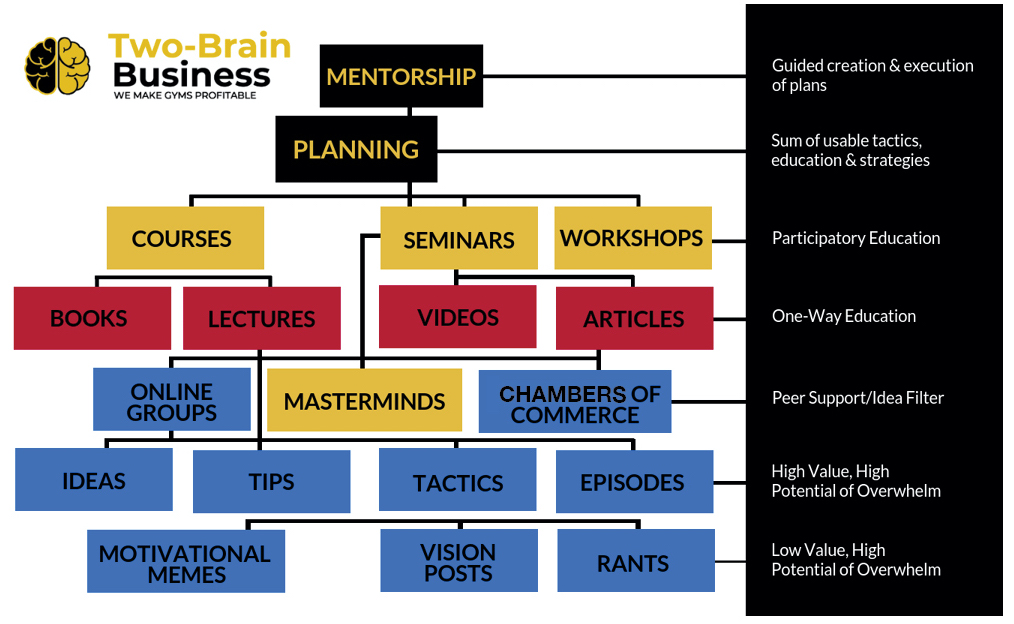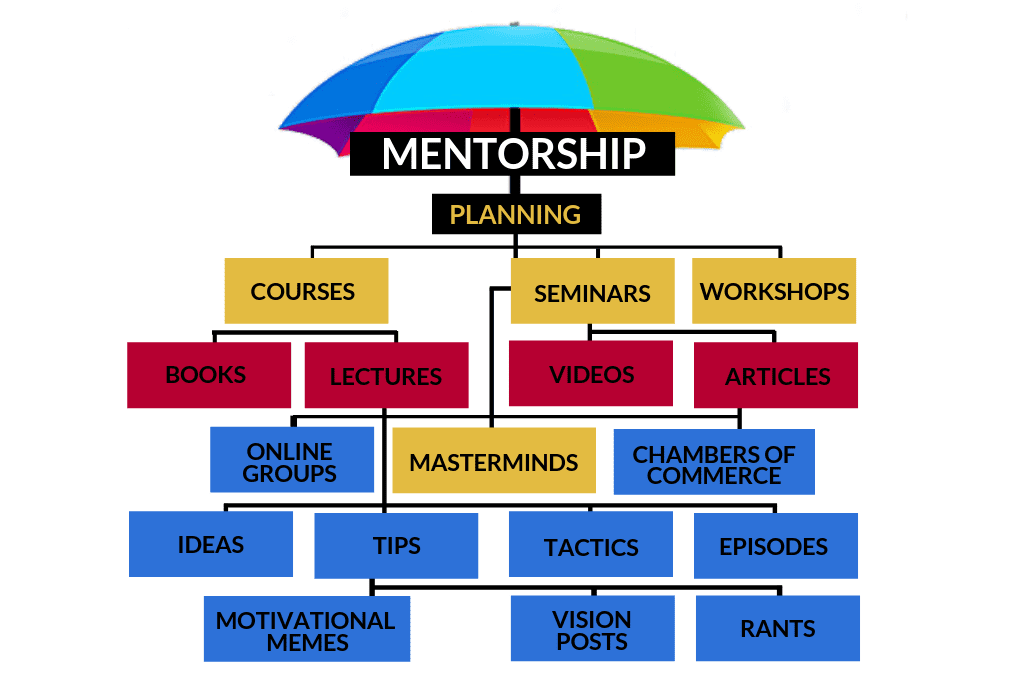A mentor helps you build a plan and stick to it.
Entrepreneurship is cool now. Guys like Gary Vaynerchuk and Elon Musk make the dream accessible to the common person.
That means there’s more information, more help, more ideas than ever before. Every single day, an entrepreneur can choose between 1,000 new podcast episodes 2,000 blog posts or hundreds of new videos on YouTube. Access to information is no longer the problem. Everyone has enough good ideas.
The new problem is overwhelm. We fail to take action because we’re paralyzed by too many opportunities.
We don’t see how each idea or tactic or habit fits into a larger plan, so we take a shotgun approach to improving our business.
And we don’t have filters for the sources of our information, so we trust that everything on the internet is true even when we know it’s not. We want to believe.
A mentor’s role is to help you sort ideas—your own or the great ones you found elsewhere—and build them into your plan. Then a mentor’s role is to help you stick to your plan or shift it to match your strengths.
If you’re trying to build a plan without a mentor, this might help: a hierarchy of business knowledge and actions:

Examining the Hierarchy
Let’s start at the bottom: the lowest value use of your time and attention.
We all love motivational memes about business, but unless they clearly say “Do this one thing right now,” they’re useless. And even if they do say, “Take this specific action,” invest your time in something more valuable if there isn’t a clear path to increased revenue.
Don’t read rants. They’re just texturbation.
The next layer (ideas, tips, tactics and episodes) has value but also carries a huge potential for overwhelm. At Two-Brain, we publish every day. Every single blog post, podcast episode and video carries an actionable idea. Every idea has been tested and proven to work. But no one can implement them all. A mentor’s job is to help you identify where you’re strong and keep you focused on those tactics. A mentor who simply throws ideas at you isn’t helping (and is probably slowing you down).
The next layer of value for your time and attention is peer support. Online groups, masterminds, chambers of commerce and business mixers all have value. The best groups are curated for quality people and moderated for quality discussion. But it’s almost impossible to tell the difference between opinion and advice, and it’s definitely impossible to spot outright lies.
No one posts burned dinner on Facebook, and no one shares business failings, either. We actually tell our Incubator clients to take a short Facebook fast and only invite them to our private Facebook group in Growth phase, where peer support is more important. Any entrepreneurs group, online or in person, is only as good as its filters.
More valuable than peer support is actual education. Presumably, lectures and books and seminars are created by people who have actually been successful and are willing to share their tactics. This layer is more valuable because of the higher-level filters: editors, publishers and “stages,” like TED Talks. Presumably, someone who knows something is filtering out the bad ideas and noise.
But many good business books would make a great blog post (there’s not much past the first chapter), and the filters are lower than ever. My advice is to read (or watch) until the expert becomes repetitive and then move on. Even in a one-way educational monologue, you still have the choice to close the book or leave the auditorium.
The next layer is a two-way education: a dialogue. These are courses, seminars and workshops in which the hosts help the attendees apply the content to their specific challenges.
I no longer run two-day seminars where I get up and lecture because they don’t help. Instead, we run action-based Summits, where a speaker introduces a topic and then attendees apply it to their businesses on the spot. One of the best tactics I learned last year was to leave a seminar as soon as you learn one good thing and spend the rest of the weekend in your hotel room working on that thing. That’s far more valuable than amassing ideas and then taking action on none.
Filter and Focus
Now, all these things, put together, form a plan. To make an effective plan, you need some distance from your current situation. You need an objective eye. That’s where a mentor comes in. A mentor is there to identify what you really need and help you identify the best tactics, to provide the best support, and to supply the right amount of accountability.
For example, many new Two-Brain clients say, “I need more clients.” Then they’ll cite an Instagram tactic they saw in a Facebook group. But then they’ll say, “I don’t have time to do it.”
So the mentor guides them through the work that will get them more time first. That’s part of the Incubator.
Then the mentor says, “Let’s determine how we’re going to spend your time.” That’s part of building an annual plan, which comes at the start of Growth Phase. If the Instagram tactic will actually generate more clients, the mentor builds it into the plan.
From there, the mentor’s role is to help the entrepreneur fill time with the best courses, support and tactics for him or her at that moment.
Do you see?
You can try to do All The Things. Or you can invest your time and budget wisely—doing the right things at the right time to the exclusion of all the noise and overwhelm.
You can spend 2019 the same way you spent 2018: making guesses, trying to do everything and feeling overwhelmed. Or you can get a mentor. This is what I realized in 2008, when I found my first mentor. And it’s why I have a mentor today. As you become more successful, the choices just get bigger.
Click here to talk with one of our team members for free. We don’t invite everyone into our mentorship practice, but there’s only one way to find out if you’re a perfect fit.

